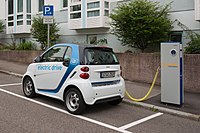You can help expand this article with text translated from
the corresponding article in Dutch. (October 2022) Click [show] for important translation instructions.
|
As of August 2022 [update], there were around 72,000 battery electric vehicles registered in Belgium, equivalent to 1.2% of all vehicles in the country. [1] As of 2021 [update], 5.8% of new cars sold in Belgium were electric. [2]
Government policy
In 2021, the Belgian government announced a policy that, starting in 2026, makes all purchases of electric vehicles for company use tax-deductible. [3]
Public opinion
In a 2022 poll conducted by Deloitte, 48% of respondents said that they would buy an electric car for their next vehicle purchase. [4]
By region
Brussels
As of November 2021 [update], there were 250 public charging stations in Brussels. [5]
Flanders
As of 2022 [update], there were around 15,000 public charging station ports in the Flemish Region. [6]
Wallonia
As of 2022 [update], there were between 1,500 and 2,000 public charging station ports in Wallonia. [6]
References
- ^ De Kerpel, Didier (16 September 2022). "Hoeveel elektrische auto's telt België in 2022 ?". egear.be (in Dutch). Retrieved 11 October 2022.
- ^ "Stijgende energiekosten kunnen toekomst van elektrische auto's in gevaar brengen, waarschuwen experts". Het Laatste Nieuws (in Dutch). 12 September 2022. Retrieved 11 October 2022.
- ^ "Belgium announces new company car electrification bill". Electrive. 31 May 2021. Retrieved 29 October 2022.
- ^ "One in two Belgians plan to buy an electric or hybrid vehicle next". Deloitte. 27 January 2022. Retrieved 27 September 2022.
- ^ "Electric car sales boom but need for charging points becomes acute". The Brussels Times. 14 April 2022. Retrieved 27 September 2022.
- ^ a b Crivellaro, Rachel; Sadutto, Maurizio (29 June 2022). "La Belgique est-elle prête pour la voiture électrique ? La Flandre largement en tête pour les bornes de rechargement" (in French). RTBF. Retrieved 9 October 2022.

